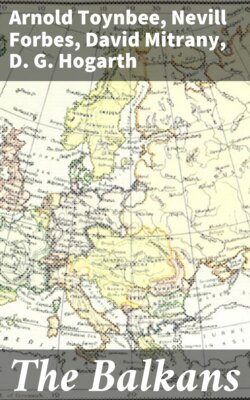Читать книгу The Balkans - Nevill Forbes - Страница 8
На сайте Литреса книга снята с продажи.
BULGARIA AND SERBIA
ОглавлениеTable of Contents
1
Introductory
The whole of what may be called the trunk or massif of the Balkan peninsula, bounded on the north by the rivers Save and Danube, on the west by the Adriatic, on the east by the Black Sea, and on the south by a very irregular line running from Antivari (on the coast of the Adriatic) and the lake of Scutari in the west, through lakes Okhrida and Prespa (in Macedonia) to the outskirts of Salonika and thence to Midia on the shores of the Black Sea, following the coast of the Aegean Sea some miles inland, is preponderatingly inhabited by Slavs. These Slavs are the Bulgarians in the east and centre, the Serbs and Croats (or Serbians and Croatians or Serbo-Croats) in the west, and the Slovenes in the extreme north-west, between Trieste and the Save; these nationalities compose the southern branch of the Slavonic race. The other inhabitants of the Balkan peninsula are, to the south of the Slavs, the Albanians in the west, the Greeks in the centre and south, and the Turks in the south-east, and, to the north, the Rumanians. All four of these nationalities are to be found in varying quantities within the limits of the Slav territory roughly outlined above, but greater numbers of them are outside it; on the other hand, there are a considerable number of Serbs living north of the rivers Save and Danube, in southern Hungary. Details of the ethnic distribution and boundaries will of course be gone into more fully later; meanwhile attention may be called to the significant fact that the name of Macedonia, the heart of the Balkan peninsula, has been long used by the French gastronomers to denote a dish, the principal characteristic of which is that its component parts are mixed up into quite inextricable confusion.
Of the three Slavonic nationalities already mentioned, the two first, the Bulgarians and the Serbo-Croats, occupy a much greater space, geographically and historically, than the third. The Slovenes, barely one and a half million in number, inhabiting the Austrian provinces of Carinthia and Carniola, have never been able to form a political state, though, with the growth of Trieste as a great port and the persistent efforts of Germany to make her influence if not her flag supreme on the shores of the Adriatic, this small people has from its geographical position and from its anti-German (and anti-Italian) attitude achieved considerable notoriety and some importance.
Of the Bulgars and Serbs it may be said that at the present moment the former control the eastern, and the latter, in alliance with the Greeks, the western half of the peninsula. It has always been the ambition of each of these three nationalities to dominate the whole, an ambition which has caused endless waste of blood and money and untold misery. If the question were to be settled purely on ethnical considerations, Bulgaria would acquire the greater part of the interior of Macedonia, the most numerous of the dozen nationalities of which is Bulgarian in sentiment if not in origin, and would thus undoubtedly attain the hegemony of the peninsula, while the centre of gravity of the Serbian nation would, as is ethnically just, move north-westwards. Political considerations, however, have until now always been against this solution of the difficulty, and, even if it solved in this sense, there would still remain the problem of the Greek nationality, whose distribution along all the coasts of the Aegean, both European and Asiatic, makes a delimitation of the Greek state on purely ethnical lines virtually impossible. It is curious that the Slavs, though masters of the interior of the peninsula and of parts of its eastern and western coasts, have never made the shores of the Aegean (the White Sea, as they call it) or the cities on them their own. The Adriatic is the only sea on the shore of which any Slavonic race has ever made its home. In view of this difficulty, namely, the interior of the peninsula being Slavonic while the coastal fringe is Greek, and of the approximately equal numerical strength of all three nations, it is almost inevitable that the ultimate solution of the problem and delimitation of political boundaries will have to be effected by means of territorial compromise. It can only be hoped that this ultimate compromise will be agreed upon by the three countries concerned, and will be more equitable than that which was forced on them by Rumania in 1913 and laid down in the Treaty of Bucarest of that year.
If no arrangement on a principle of give and take is made between them, the road to the East, which from the point of view of the Germanic powers lies through Serbia, will sooner or later inevitably be forced open, and the independence, first of Serbia, Montenegro, and Albania, and later of Bulgaria and Greece, will disappear, de facto if not in appearance, and both materially and morally they will become the slaves of the central empires. If the Balkan League could be reconstituted, Germany and Austria would never reach Salonika or Constantinople.
2
The Balkan Peninsula in Classical Times
